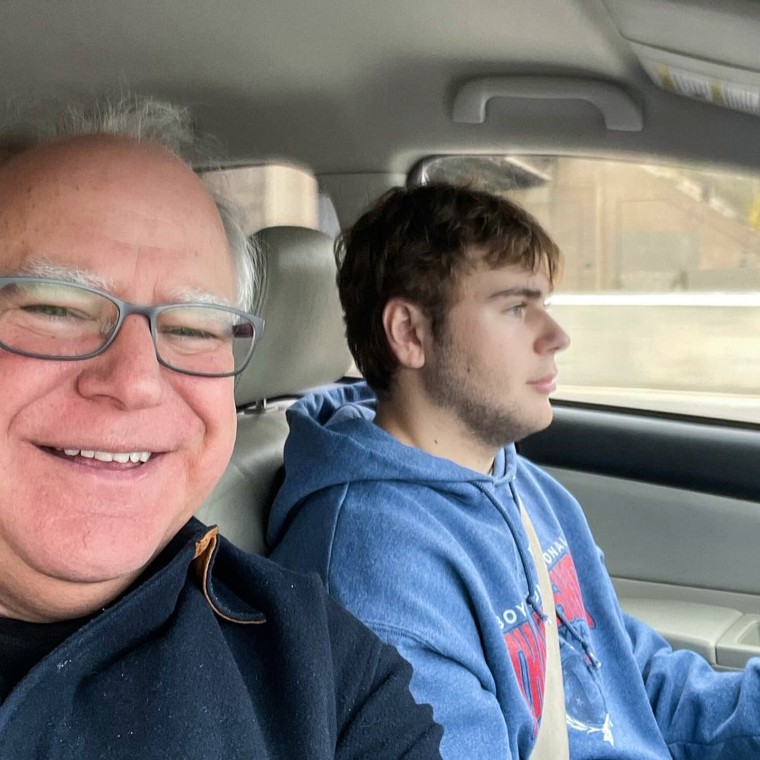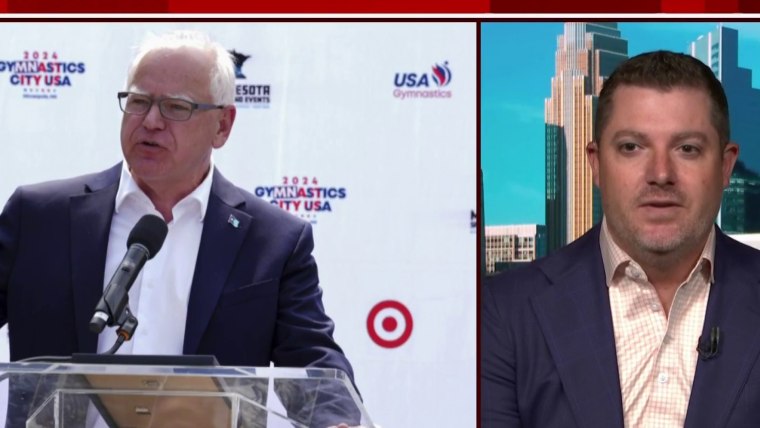Minnesota Gov. Tim Walz’s open acknowledgement that he and his wife used fertility treatments to conceive their two children and his candid discussions about that generated one of the most moving moments during a rally in Glendale, Arizona, when people chanted the name of his firstborn daughter, Hope. The positive reaction to the candidate’s discussion of the topic confirms the thumbs-up that Vice President Kamala Harris got for choosing her running mate from every faction of the Democratic Party — from moderates such as Rep. Abigail Spanberger, D-Va.; progressives such as Rep. Alexandria Ocasio-Cortez, D-N.Y.; and even erstwhile conservative Democrat Sen. Joe Manchin, I-W.Va., who left the party this year.
What makes the Walz family’s story so reassuring is that they seem to want to help Gus live a good life rather than change who he is.
But Tim and Gwen Walz also deserve positive attention for the way they’ve discussed their son, Gus, who came into the national spotlight thanks to a piece in People magazine, about his nonverbal learning disorder and attention-deficit/hyperactivity disorder. That makes him double-neurodiverse.
Simply having a neurodivergent son is not enough reason for him to be praised; indeed, many parents of neurodivergent children have been harmful to their children and peddled harmful ideas, including the idea that vaccines cause autism. Rather, what makes the Walz family’s story so reassuring is that they seem to want to help Gus live a good life rather than change who he is.
According to the Child Mind Institute, nonverbal learning disorder, or NVLD, affects nonverbal forms of learning like the ability to notice patterns or learn concepts, including visual and social patterns as well as concepts in language and math. Because of the similar traits, people with NVLD are often confused as being on the autism spectrum and vice versa. Most recently, comedian Chris Rock disclosed that he received a diagnosis after a friend initially thought he might be somewhere on the autism spectrum.
But while in the past, much of the focus of society and parents has been on how to "fix" people who are neurodivergent, the Walzes, who said they noticed that “it became increasingly clear that he was different from his classmates” and saw that he preferred video games and time to himself, made sure in the People article not to highlight Gus’ deficits.
Rather than wring their hands, his parents emphasized that he “is brilliant, hyper-aware of details that many of us pass by, and above all else, he’s an excellent son and brother to his sibling.”
It’s encouraging that the Walzes appear unconcerned with forcing Gus to be more sociable. That must be a hard temptation to resist for a political family that spends time on the campaign trail. Their focus on what Gus does well is a welcome change from the old days. To cite one infamous example, when a teenage Paris Hilton was diagnosed with attention-deficit disorder, she said she was sent to a residential treatment facility because her parents believed she could be “fixed” with “tough love.” Even today, some children with ADHD have food withheld from them as punishment.

The Walzes’ words and their embrace of their son may seem utterly unremarkable. But that’s the point. Loving your children, celebrating their gifts and embracing them fully ought to be unremarkable whether they’re neurodivergent or neurotypical. Neurodivergent people deserve parents who are dedicated to helping them thrive. They deserve family members who know that the way they love, interact and see the world, while different from their neurotypical counterparts, deserves the same respect.
Walz appears to be doing his part on improving the lives of people with disabilities as governor. As my friend David Perry wrote, he’s worked on phasing out parental fees for children on Medicaid, which would reduce the financial burden for parents of children with disabilities.
Similarly, the Walz family is fortunate to live in Minnesota, which has programs like Partners in Policymaking (established in 1987) to help people with disabilities and to help their loved ones become better advocates. An AARP survey ranked Minnesota as the No. 1 state overall for long-term services and supports. As for Harris herself, she was the first presidential candidate to release a disability policy in the 2020 Democratic primary.

I still wouldn’t say the Walzes have been perfect in how they discuss their son’s disability. For example, when speaking about his disability, they’ve said that his “condition is not a setback — it’s his secret power.” This statement disregards the real accommodations that Gus will need if he is to go to college or enter the workforce. Similarly, many neurodivergent people chafe at the idea of having a “superpower” because of the implication that their worth is tied to their being superior than their counterparts at some tasks.
At the same time, it is still a step forward that the Walz family doesn’t see Gus as deficient and has instead focused on what is possible for him, such as obtaining his driver’s license. Importantly, with the national profile they now have, the Walz family can serve as a model to show parents of children with developmental disabilities the joys that come with embracing, and not mending, their children.

